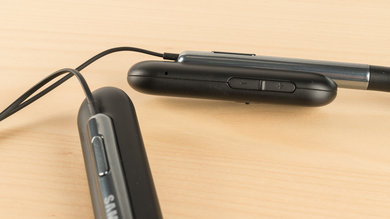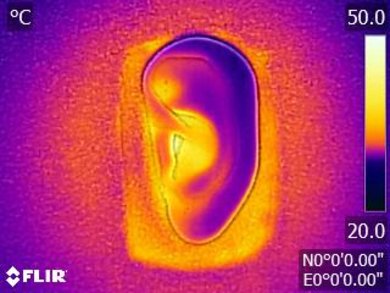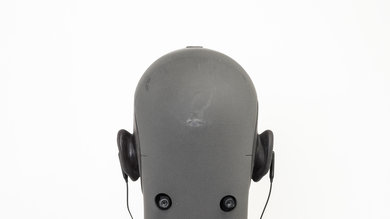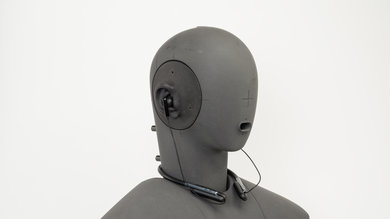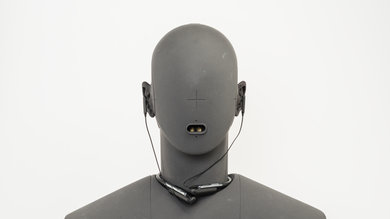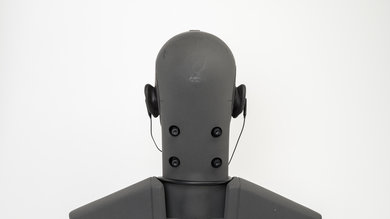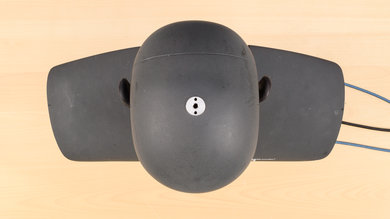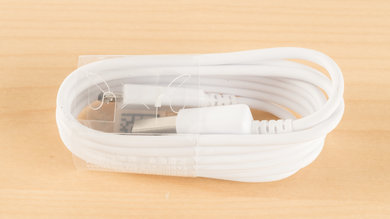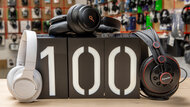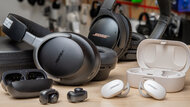The Samsung U Flex are decent wireless in-ears for most use cases. They sound decently well-balanced if a bit sharp on some tracks, and have an around-the-neck design that's a bit bulkier than most but flexible enough to fit into some pockets. They have a decent battery life and an excellent wireless range but struggle to isolate in loud, noisy environments. They're also fairly limited in customization options if they're not paired with a Samsung device which is a bit disappointing.
Our Verdict
The Samsung U Flex are sufficiently versatile headphones for most use cases. They have a good battery life and an excellent wireless range. They have a flexible and comfortable design that won't be too cumbersome but isn't as portable as the BeatsX. They also have a relatively poor isolation performance so they won't be the best headphones to use in loud environments. Unfortunately, their app is limited to Samsung-only devices which will not be ideal for some listeners especially since the Level U Pro does not have that constraint.
-
Low leakage.
-
Great wireless range.
-
Easy to use and portable design.
-
Poor noise isolation.
-
Sharp audio reproduction.
-
Limited customization options.
Average for neutral listening. They have a decent audio reproduction but sound a bit too sharp on already bright tracks. Unfortunately, you can only EQ them with Samsung devices so they won't have the best sound quality for neutral listening. They also have a small closed-back in-ear design that cannot produce a spacious soundstage.
Above-average for commuting. They're lightweight, easy to carry around and have a good control scheme. However, they do not block as much noise as some of the other in-ear headphones we've tested so they won't be the best option for noisy commutes or flights.
Good for sports. The Samsung U Flex have an around-the-neck design that's stable enough for running or jogging. They're also lightweight, portable and wireless. However, the in-ear tips do slide a bit in the ear canal during more strenuous activities, and the bulky neckband can sometimes pull the earbuds out of your ears, which won be ideal for more intense sports.
Above-average for office use. They don't block a lot of noise, but thanks to their incredibly low leakage, you can mask some of the office chatter, by playing your audio at high volumes and not disturb others.
Below-average for gaming. They have a mediocre-at-best microphone, and a bit too much latency to be suitable for gaming. Their app also does not offer as many customization options typical for gaming headphones.
- 7.0 Mixed Usage
- 6.9 Neutral Sound
- 7.2 Commute/Travel
- 7.8 Sports/Fitness
- 6.8 Office
- 5.7 Wireless Gaming
- 5.5 Wired Gaming
- 6.9 Phone Call
Changelog
- Updated Nov 21, 2019: Converted to Test Bench 1.3.1.
- Updated Nov 21, 2019: Converted to Test Bench 1.3.
- Updated Mar 22, 2018: Review published.
- Updated Mar 20, 2018: Our testers have started testing this product.
- Updated Mar 18, 2018: The product has arrived in our lab, and our testers will start evaluating it soon.
Check Price
Compared To Other Headphones

The Samsung U Flex have an easy-to-use and decently portable design. They're comfortable and flexible enough to fit into some pockets and they sound decently well-balanced, although they can be a bit sharp on already bright tracks. They have a good battery life and a decent wireless range but unfortunately, their app is limited to Samsung only devices which means they won't be as customizable as some of the other competing around-the-neck headphones. Overall, they're one of the best cheap earbuds, the best earbuds under $50, and the best Bluetooth earbuds under $50 for build quality that we have reviewed so far.
The Samsung Level On Wireless are a better choice if you want on-ears, but if you prefer a slightly more portable design, then an go for the Samsung U Flex instead. The U Flex are more portable than the Level On and the Level U Pro, thanks to their flexible neckband design that will fit into some pockets. They also have a bit more customization options than the Level On when connected to a Samsung device, although not by much since they aren't noise cancelling headphones. The Level On, on the other hand, have a longer battery life and support more codec options than the U Flex. Also, since they are noise cancelling, they do a little better in noisy conditions. They also have better sound quality.
The Samsung Level Over Wireless are a much better wireless headset than the Samsung U Flex if you prefer over-ears to in-ear headphones. The U Flex are a lot more portable than the Level Over Wireless. They're also more breathable and stable for sports and physical activity. On the other hand, the Level Over Wireless have a better default sound quality that you can customize with any Android phone, not just Samsung devices like the U Flex. They're also noise cancelling headphones, so they're a bit more suitable for noisy conditions and commuting, and they have a longer battery life than the U Flex.
The Samsung U Flex and the Samsung Level U Pro have about the same performance overall. The U Flex are better-built and look more premium than the U Pro. They also have a more flexible neckband that makes them a bit more portable since you can fit them into some pockets, unlike the U Pro. The U Flex also have more customization options, but only on Samsung devices, unlike the U Pro which have the same features on all Android phones that support the Level app. The U Pro also isolate a bit better than the U Flex, but that is heavily dependent on the fit you can achieve with the provided in-ear tips. On the upside, the Level U pro have a lot more codec options, making them suitable for watching movies if you have the right Bluetooth transmitter with aptX-LL.
The Samsung U Flex Wireless are better headphones than the Sony WI-C400 Wireless. Their sound quality is noticeably better, especially in the bass range, and they offer some customization options if you have a Samsung device as well. While their battery life is slightly shorter, they take less than half the time to charge fully, and you can also use them when charging. They can connect to two devices, have better wireless range, and also lower latency. They also feel more durable and better-built than the Sony WI-C400. The Sonys have NFC compatibility that the U Flex don’t have.
The Jabra Elite 65e are a better around-the-neck headset than the Samsung U Flex. The Jabra Elite 65e are noise cancelling earbuds, so they perform a bit better in noisy conditions and are a bit more comfortable to wear than the Samsung Level U Pro. The Elite 65e also have a better microphone and a sturdier, more premium looking build quality that's flexible enough to fit into some pockets, unlike the U Pro. On the upside, the Level U Pro are a slightly better value for their low price point, and they also support more codecs so you can use them to watch TV if you have Bluetooth source that supports aptX-LL (Low Latency).
The Samsung U Flex Wireless are a slightly better around-the-neck design than the Jabra Elite 25e Wireless. The Samsung has a better-built neckband that's flexible enough to fold and fit into your pockets. The Samsung also have a more stable and slightly better isolating in-ear fit. They have customizable sound and a wealth of features, but only if you're paired with a Samsung device. The Jabra, on the other hand, will be more comfortable for some thanks to their earbud fit. They also have a much longer battery life than the Samsung.
The Samsung U Flex Wireless are slightly better around-the-neck headphones than the Anker SoundBuds Life. The Samsung have a flexible neckband that will easily fit into your pockets. The Samsung also includes a better-balanced sound, a more durable design, and a lot more customization options, but only when connected to Samsung devices. On the other hand, the Anker offer a slightly better value for your money and have a better battery life that should last you long enough for most activities and use cases.
The JBL Live 200BT Wireless are slightly better headphones than the Samsung U Flex Wireless, especially if audio quality is your most important criteria. Their fit also isolates against more ambient noise, which makes them a slightly better option for commuting. However, both headphones are very similar, and if you have a Samsung device, the U Flex might be the better option since you get access to the Samsung Level app.
Test Results
The Samsung U Flex look pretty good and well built. They feel a bit more premium than the Level U Pro thanks to the silver accents on the on the tips of the control modules. However, they're quite a bit bulkier which makes them stand out a bit more than the U Pros, which won't be for everyone. On the upside, the in-ear buds also feel well-made and have magnetic backs that stick together to make them more manageable when not in use. The only part of the Flex's design that feels a bit cheap is the earbud cables, which are thin and do not look as durable as some of the other around-the-neck designs like the Bose QuietControl 30.
The Samsung U Flex like the Level U Pro, are decently comfortable in-ear headphones as long as you don't mind the around-the-neck design. The neckband is considerably bulkier, so you feel it around your neck a bit more when working out than you would with the U Pros. As for the earbuds they have a decently angled fit that doesn't put too much pressure into the ear canal, but they're still fairly conventional in-ears, so if you're not a big fan of in-ear designs than you will have some of the same issues with the U Flex.
The Samsung U Flex have an efficient button layout and control scheme. They provide call/music, track skipping, and volume controls. They also have a dedicated button for voice assistance. The buttons deliver good tactile feedback, and they're easy to find by touch. However, skipping tracks is done by holding the volume keys which may not be ideal for some but you get used to it fairly quickly.
The U Flex, like most in-ears, are very breathable headphones. They trap a little bit of heat within the ear canal but it's negligible and should not make you sweat more than average. They're suitable for more intense workouts but the friction of the neckband isn't factored in breathability since it will most likely go over an item of clothing.
These headphones are decently portable. They have a slightly bulkier neckband than the Level U Pro, but since they're a bit more flexible, you can fold them to fit into larger pockets. Compared to the Sony WI-C400, and Jabra Elite 25e, they have a more flexible around-the-neck design. They won't be as portable as other around the neck designs like the BeatsX, but they're fairly easy to carry around on your person since you can let them rest around your neck or tuck them under your shirt when you're not using them. Unfortunately, they don't come with a case or pouch which is a little disappointing.
These headphones do not come with a case or pouch.
The Samsung U Flex are decently well-built headphones. The neckband is sturdy and flexible, and the earbuds feel dense and well-made. Unfortunately, the audio cables are a little thin, susceptible to wear and tear, and do not retract or detach so you can't replace them. Compared to the Bose QuietControl 30 the cables do not feel as durable and may snap if they get repeatedly hooked to an item of clothing if you often place the neckband under your outfit.
The around-the-neck design of these headphones makes them above-average stable. They won't fall from your neck if you run or jog with them but the neckband does move around a little and tugs on the earbud cables. This means although the in-ear fit stays put for most exercises, they will sometimes get pulled out of your ears by the neckband which is not ideal. Overall they're stable enough to use as sports headphones but they won't be the best choice if you have more intense workout routines.
The Samsung U Flex has excellent frequency response consistency. This is assuming the user is able to achieve a proper fit and an air-tight seal using the assortment of tips that come with the headphones. If so, then they should be able to get consistent bass and treble delivery every time they use the headphones.
The Samsung U Flex have a good bass. Their LFE (low-frequeny extension) is at 30Hz, which is good, but not as low as most other in-ears or earbuds. The Jaybird X3, Beats BeatsX, and BeoPlay E8, all have LFEs lower than the UFlex. Accordingly, sub-bass, which is responsible for thump and rumble, is lacking by 5dB. Mid-bass, occupied by the body of bass guitars and the punch of kick drums, is lacking by about 3dB, which is subtle but noticeable. High-bass is even and virtually flat.
The mid-range is very good. The response is quite even, but with a broad 8dB recess centered around 700Hz. This gives less emphasis to vocals and lead instruments by pushing them towards the back of the mix.
The treble performance is about average. The response is relatively even from 2KHz up to 7KHz, but overemphasized by about 4dB. This adds a bit of excess brightness to the sound which will be especially noticeable on vocals and lead instruments. The +10dB peak around 10KHz makes S and Ts noticeably sharp and piercing, which may be uncomfortable for those with overly sensitive ears (hyperacusis).
The imaging is very good. Their weighted group delay is 0.08, which is one of the lowest we have measured. The GR graph also shows that the entire audible portion is below the audibility threshold. This indicates a tight bass and a transparent treble reproduction. Additionally, the L/R drivers of our test unit showed measurable frequency, amplitude and phase mismatch, which could skew the stereo image a bit. But not enough to have a large noticeable effect on the localization of objects (like voices, instruments, and footsteps).
The soundstage is poor. Creating a large and speaker-like soundstage is partially dependent on having a speaker-like pinna activation. However, the Samsung, due to their in-ear design, bypass the pinna and don't interact with it. Therefore, their soundstage will be perceived to be small and located inside the listener's head. Their closed-back design also means that their soundstage won't feel and open as open-back earbuds like the Apple AirPods (1st generation) Truly Wireless and the Bose SoundSport Free Truly Wireless.
The Samsung U Flex has a sub-par isolation performance, but there are other in-ears like the Jaybird X3, Beats BeatsX, and the BeoPlay E8 that offer much better passive isolation. In the bass range, occupied by the rumble of airplane and bus engines, they achieved about 1dB of isolation which is not really noticeable. In the mid-range, important for blocking out speech, they achieved about 15dB of isolation, which is good. In the treble range, occupied by sharp S and T sounds, they reduce noise by more than 26dB, which is above-average.
The leakage performance is very good. The significant portion of their leakage is in the treble range and they do not leak in bass or mid ranges. This means the leakage will sound quite thin and mostly consist of S and Ts (sibilances). Also, the level of the leakage is not very loud, peaking at around 60dB at 1 foot away, which is just above the average office noise floor.
The Samsung U Flex has an average integrated microphone. In quiet environments, speech recorded or transmitted with this mic will sound relatively thin and muffled, but overall more detailed and understandable than most Bluetooth headphones. However, they tend to sound too sharp on S and Ts which could be fatiguing for the person on the other side. In noisy situations, they perform well in moderately loud environments like a busy street, but they may struggle to separate speech from background noise in loud places, like a subway station.
The mic has a decent recording quality. The LFE (low-frequency extension) of 289Hz means that speech recorded or transmitted with it will sound relatively thin. The HFE (high-frequency extension) of 7.9KHz is above average, indicating a speech that is relatively muffled, but easily understandable and not lacking a lot of detail. The sharp peak at 7KHz however, makes the S and Ts sharp and piercing, so they may get fatiguing for the person on the other line after a while.
The integrated microphone of the Samsung U Flex is average at noise handling. In our SpNR test, they achieved a speech-to-noise ratio of 19dB, suggesting they are well suited for quiet and moderately loud environments. But they won't be best for very loud environments, as they may struggle to separate speech from unwanted noise.
These headphones have a good battery life and charge relatively fast. You can also use them while they're charging which makes them a bit more convenient for the office. They lasted 11 hours on average and took 1.8 hours to fully charge. They also have a long standby mode but no auto off-timer. Overall, they should easily last throughout an entire day of heavy use but having an auto-off feature when inactive would have improved their batter performance by quite a bit.
The Samsung Level app with the U Flex would have been one of the best and most customizable support software that we've tested if it was available on iOS and wasn't limited to Samsung phones. The app is nearly useless when paired with a regular Android device. All you get is a basic menu with a battery status level that doesn't show the actual % value of the battery life and basic notification management. However, when paired with a Samsung Galaxy S8 there are a multitude of options that you can customize like a graphic EQ with presets, room effects, volume monitors, and a music playback timer. It's a fully featured app on Samsung phones that feels stripped down on regular Android devices which limiting for all the users that purchased the U Flex and do not have a Samsung device.
These headphones do not have NFC support for Bluetooth pairing but can connect to two devices simultaneously. They also have an easy to pair switch similar to the Bose headphones and automatically pair to the last synced device once you turn them on.
The Samsung U Flex do no have any low latency codecs like the Level U Pro. They still perform quite well for a Bluetooth headset at 144 ms of latency. However, they still have a bit too much lag to be the best headphones for watching movies and gaming.
They have no wired option. If you want a good sounding wired in-ear, check the 1More Triple Driver In-Ear.
These headphones do not have a dock. If you want a headphone that's versatile and has a dock, try the SteelSeries Arctis 7. However, it won't be as compact or portable.
Comments
Samsung U Flex Wireless: Main Discussion
Let us know why you want us to review the product here, or encourage others to vote for this product.



